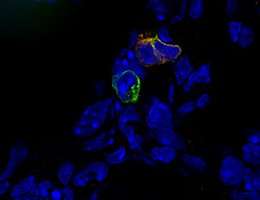CD27 is expressed within atherosclerotic plaques in CD4+ helper T cells. Source: H. Winkels, N. Gerdes. Credit: Ludwig Maximilian University of Munich
The receptor CD27 found on the cell surface of certain types of immune cells is required for the production of so-called regulatory T cells in the thymus, that limit the development of atherosclerotic plaques.
Atherosclerosis is a consequence of the formation of deposits – known as atherosclerotic plaques – that are largely made up of lipid molecules and several types of immune cells that form on the walls of the major arteries. The initial build-up of fats triggers inflammatory reactions, mediated by the recruitment of cells of the immune system at these sites. Moreover, such reactions can become chronic, promoting further growth of the plaques ultimately leading to a blocked blood flow. Failure to resolve localized inflammation itself reflects a breakdown of the regulatory mechanisms that normally control this type of immune reaction. The immunostimulatory receptor protein CD27 plays an important role in regulation of immune responses. It is expressed on the surfaces of certain immune cell types, and interacts with other immune cells that carry a specific protein ligand called CD70. Researchers led by Professor Norbert Gerdes, Professor Esther Lutgens and Dr. Holger Winkels of LMU's Institute for Cardiovascular Prevention (IPEK) have now demonstrated that although CD27 has a stimulatory effect on immune responses, it nevertheless serves to inhibit the development of atherosclerosis.
In both human and mouse atherosclerotic plaques CD27 is found on T cells, one of the two major classes of cells that comprise the adaptive immune system (the other being the bone-marrow-derived B cells). Using the mouse as an experimental model, Gerdes, who is also affiliated with University Hospital Düsseldorf, and his colleagues have now shown that atherosclerosis is significantly enhanced in mice that are deficient in CD27. In other words, in spite of its immune-stimulating function, CD27 appears to have a negative effect on the inflammatory reactions in atherosclerotic plaques. The researchers also noted a significant reduction in the numbers of so-called regulatory T cells (Treg) in advanced plaques formed in mice deficient in CD27. Treg cells are known to function as a brake on the activities of other immune cells and help to keep inflammation reactions under control. Thus, these findings are consistent with their suggested role in slowing the progression of atherosclerosis. Strikingly, in the absence of CD27, the numbers of Treg cells fell not only in the arteries but also in the thymus, the organ in which T cells are generated. This was shown to stem from an increased susceptibility of CD27-lacking Treg to programmed cell death in the thymus. Hence, the researchers suspected that CD27 must play a positive role in the production of regulatory T cells. To test this idea and show that the shortage of Treg cells was actually responsible for stimulating the progression of atherosclerosis, they infused their CD27-deficient mice with functional regulatory T cells. And indeed, this measure effectively blunted the atherosclerosis-promoting effect associated with the loss of CD27. Other types of immune cells were not affected by the lack of CD27.
In an earlier study, Gerdes and his team had shown that CD70, the ligand that interacts with CD27, also contributes to the inhibition of atherosclerosis. Loss of CD70 led to a fundamental change in the properties of the macrophages (the cells responsible for the destruction of cells marked for disposal by the immune system), which themselves play a prominent role in atherosclerosis. According to the authors – taken together – the results of the two studies have significant implications not only for the treatment of cardiovascular disease, but also for cancer therapy. Antibodies that specifically modulate the function of CD27 and CD70 are currently undergoing clinical tests of their efficacy as potential anti-cancer drugs. The new findings suggest that their therapeutic use in the treatment of cancer might also have an impact on the cardiovascular system.
More information: Holger Winkels et al. CD27 co-stimulation increases the abundance of regulatory T cells and reduces atherosclerosis in hyperlipidaemic mice, European Heart Journal (2017). DOI: 10.1093/eurheartj/ehx517
Journal information: European Heart Journal
Provided by Ludwig Maximilian University of Munich





















